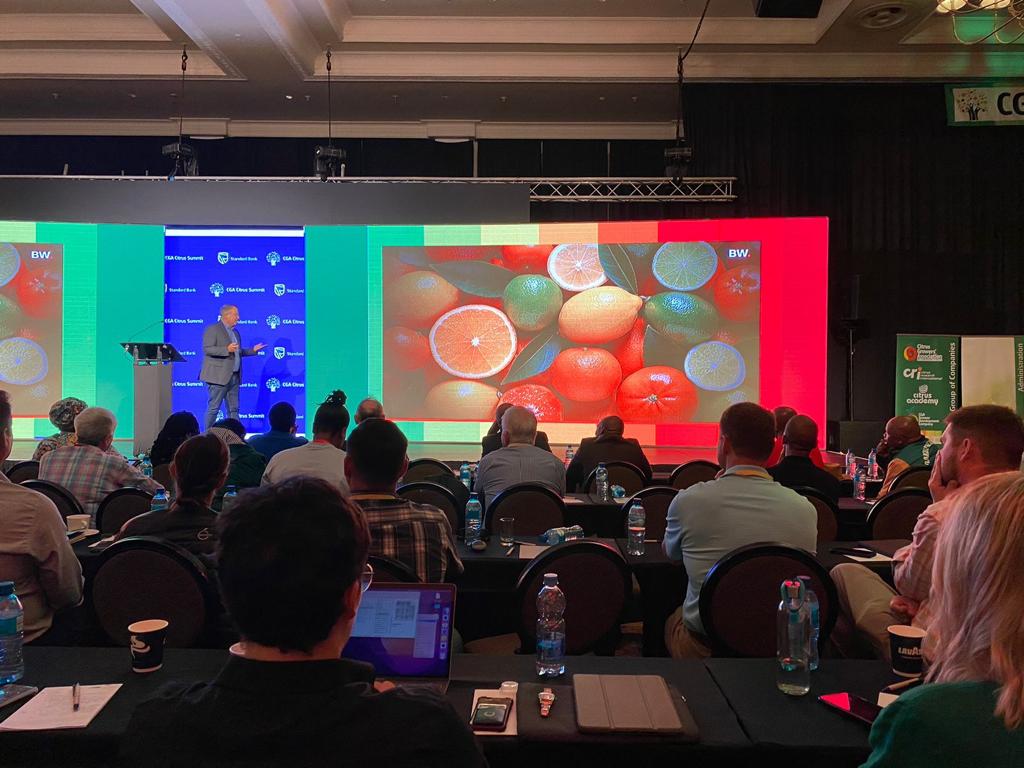
I saw a wine farmer friend the other day. “How’s the harvest going?” I asked, concerned about the impact of the unseasonably wet summer in the Western Cape. “I wouldn’t be a proper farmer if I didn’t complain about something,” he replied, “if you talk to farmers and you are not complaining, they don’t treat you seriously.”
Farmers, especially exporters, do have plenty to complain about, but there are some fundamental issues that will drive many out of business in the next couple of years. Earlier, I saw a heartfelt post by farmer @MbaliNwoko fearing for the future of farmers and agriculture amidst soaring cost pressures and high debt levels. Many face extreme pressure. Her trailer-loads of freshly picked plump green peppers look glorious and from what I have seen her post, I suspect she will overcome short-term obstacles and will flourish:
I was privileged this week to be invited to speak at the national annual showcase of the Citrus Growers Association, a gathering of about 600 people involved in all aspects of fruit production.
They too have plenty to complain about but have long-since learned it achieves nothing of value. Rather than wallowing in self-pity amidst the trials and tribulations of the country, they are seeking growth opportunities and are focussing on areas under their control and working hard to influence the parts they don’t. It’s a never ending uphill struggle.
With mounting domestic issues affecting everything from energy security to crumbling road, rail and port infrastructure, plus the ever present concern that a future government might stake a claim to their land, they continue to grow and invest.
South Africa, courtesy of its remarkable agriculture sector remains the world’s second biggest exporter of citrus fruit after Spain and local farmers plan to grow from 160 million cases of export fruit annually, to 260 million within a decade.
Fruit farming requires a mix of foresight, optimism and significant faith as trees planted today will only yield decent fruit years from now.
It’s hard enough to plant the trees, keep the pests at bay and ensure a successful harvest than also have to worry about land rights, water crises and a host of man-made failings in a fiercely contested political environment.
Yet, as is the nature of agriculture they persist and continue to invest in every aspect of food production, it’s storage and supply chains and are looking for new markets.
They have two choices: they can stop trying. That however would breed complacency and speedy failure, they can sell, but farming is in their blood, so they persist instead, evolve and make themselves an indispensable part of the economy, responsible, according to agricultural economist Wandile Sihlobo for 15% of the country’s foreign exchange earnings from exports.
The foreign domiciled MD of a global multi-national asked me recently what it was in the character and work ethic of South Africans they employ worldwide. He was paying tribute to the leadership of the South African management team of the local operations and commenting too on the effectiveness of people from here he employs.
The best answer I could come up with, and I am curious as to what you think, in the comments below, is that they have learned over years to manage high-functioning businesses in a deeply dysfunctional environment where there is no safety net to catch them and their families in the event of catastrophe. That knowledge that no-one has their back if things turn against them makes them, broadly speaking of course, deeply resourceful, detail orientated and persistently aware that there is no plan B and failure could be fatal. It focusses the mind.
A bit like Spanish conquistador Hernán Cortés who in 1519 arrived in South America to battle the Aztec empire. He famously ordered the ships that had brought him and 600 men from Spain, burned, to show there was no retreat and no escape and that the only way they would survive was to win the battles they would face. There was no turning back.
For most farmers in South Africa there is also no plan B, they cannot afford to fail. Hence there is a relentless quest to succeed and it’s remarkable.



